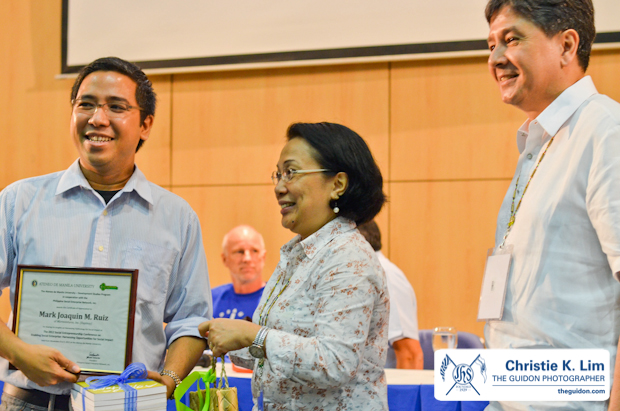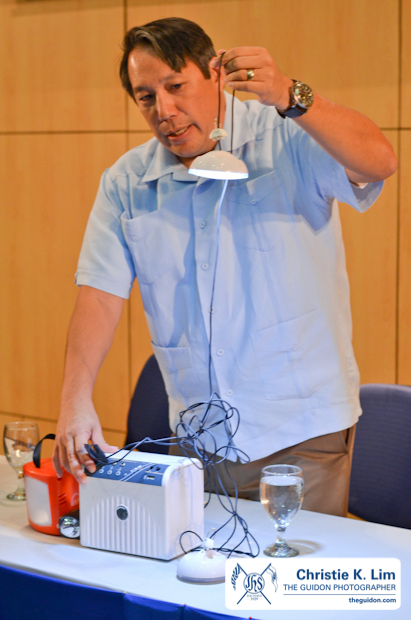
BUILDING TRUST. Several speakers in the conference say that building trust between the entrepreneur and the community is essential to the success of sustainable businesses. Photo by Christie K. Lim
SOCIAL ENTERPRISES sought to address urgent social issues faced by Philippines in the 2012 Social Entrepreneurship Conference held at the Leong Hall Auditorium last November 8 and 9.
Pressing social challenges include the lack of government presence in rural areas, the lack of renewable energy sources and the excessive use of fossil-fueled vehicles for public transportation.
The Development Studies Program, headed by Leland Dela Cruz, organized the conference. It aimed to provide various stakeholders in the social enterprise sector a venue to assess existing opportunities, as well as to seek out new ones to further empower social enterprises.
The conference focused on the opportunities available to social enterprises to increase their social impact. It covered four key opportunities available to Filipino social enterprises: financing opportunities, the Social Enterprise bill, technology and social entrepreneurship and partnership opportunities with the government.
Solar-powered products
One of the panelists was Jaime Ayala, founder of Hybrid Social Solutions, Inc. (HSSI). He has worked on economic development in emerging markets for 25 years in various roles as a social entrepreneur, chief executive officer, management consultant and board member of a handful of non-governmental organizations.
HSSI is a Filipino, public service-oriented company that distributes and services world-class, innovative products designed to help rural communities in their development by providing them access to basic development-oriented goods and services.
In an interview with The GUIDON, he shared HSSI’s main focus regarding social innovations. “Our technology is addressing the issue of energy properties because close to 25 million people have no electricity in the Philippines.”
He added, “Without electricity, the communities can’t develop because they won’t have light, cellphones, Internet connection and no pump for irrigation.”
“That’s why we are bringing in third-generation solar-powered products,” he said. These lines of products include lamps, lights, mobile phone chargers, power boxes and other low-powered direct current home devices.
Ayala further noted that they bring these products to the rural areas. They also have financing, maintenance and training for the people who are able to use them on a permanent basis. “We are trying to bring access to these things to the remote areas so that they can develop; we’re empowering all villages in the Philippines.”

PROGRESSIVE ENDEAVORS. The conference organized by the Devel- opment Studies Program gathered social entrepreneurs who believe in sustainable enterprises. Photo by Christie K. Lim
eJeepney: “Sustainable transportation”
The Institute for Climate and Sustainable Cities (ICSC) is a pioneering, Manila-based, non-profit group that works on fair climate policy and sustainable energy solutions.
The ICSC launched the electric jeepney in July 2007.
It produced the first domestically manufactured eJeepney, acquired the first official registration papers issued for electric jeepneys in 2008, created the first public routes dedicated to electric public transport and made the first electric vehicle charging station in 2009, and initiated the first e-vehicle battery-swapping program in 2011.
Executive Director of ICSC Renato Constantino said, “Our goal is to introduce different walls of sustainable transport that demonstrate to people that sustainable alternatives are actually more economically viable to them as compared to fossil fuels, which also pollute the environment and are very inefficient.”
The institute is behind the Climate-Friendly Cities (CFC) initiative, which integrates sustainable transport with clean energy generation. The ICSC also formed the private consortium which received the first commercial eJeepney fleet franchise in 2012.
When asked about ICSC’s target market, Constantino replied that they would be operators, small investors and interested members of the public transport sector.
Technology for indigenous people
Management Committee Head of the Alternative Indigenous Development Foundation (Aidfi) Auke Idzenga discussed how his social enterprise has been able to help indigenous peoples (IPs).
“[We developed] the hydraulic ram pump, the pumping of water to villages which are higher-elevated than the source. [We have] a few small battery charging projects to hydropower, too. These are all based on simple technologies which can be repaired and maintained by the people themselves,” he said.
Aidfi maintains two major programs: appropriate technologies and sustainable agriculture. The technology program develops technologies for basic needs such as drinking, irrigation, sanitation, access to energy and agricultural equipment for production and processing.
When asked about the vision of Aidfi, Idzenga answered, “For the communities, we are only there because the government can’t penetrate everywhere, so we do the leftovers in the most extreme areas, but ours is… like a triggering point to empower them and demand more from the government or to negotiate more with companies or with NGOs for further development.”
New technology, old concerns
A participant from the audience asked the group of social entrepreneurs how people could welcome changes in technology so as not to “scare people off” from using them.
Constantino said that in introducing new technology, social entrepreneurs have to be clear about their purpose. “When we talk to drivers, operators [and] interested investors, we don’t talk about climate change. We talk about new technology, how it becomes a source of additional revenue,” he said.
He added that it was crucial to understand the cultural mindset of people.
Ayala focused on the communication between the social entrepreneur and the community, wherein trust can take root.
“We really start with the premise that nothing is going to happen unless we have dialogue and that dialogue needs to be rooted in trust and their needs.”







